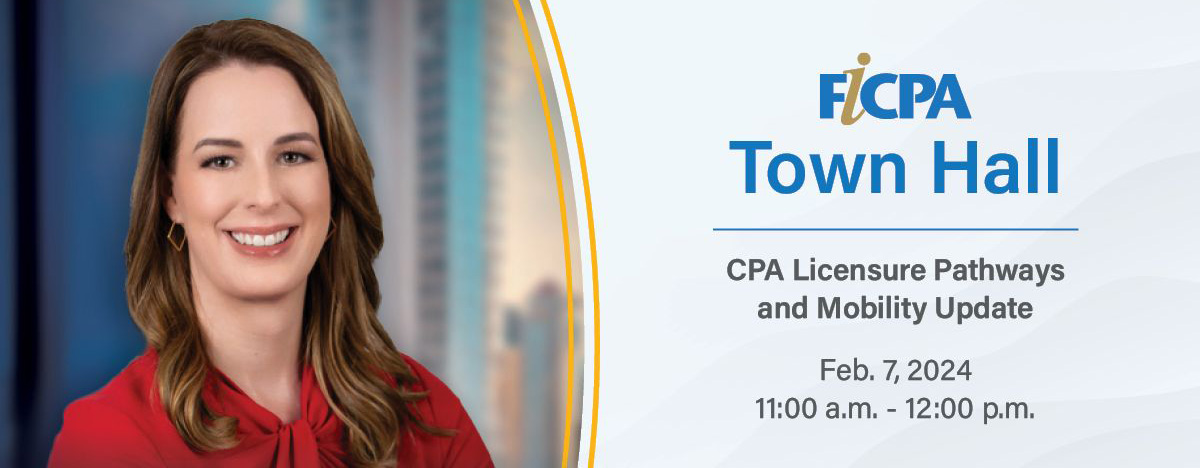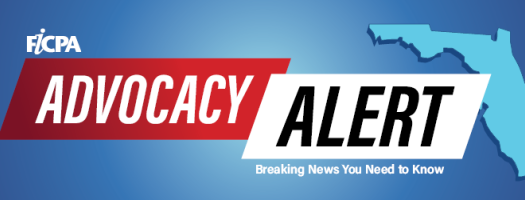
CPAs currently benefit from a national licensing system, known in shorthand as “CPA mobility,” that permits almost complete practice movement from a CPA’s home state of licensure into other states without having to obtain additional licenses, register with the other state or pay fees.
This freedom of movement gives CPAs and their employers the flexibility to serve clients across state lines, virtually or in person, without the extra burden of obtaining separate licenses for each state in which they practice.
FICPA Town Hall with Shelly Weir

On Wednesday, Feb. 7, 2024, FICPA President & CEO Shelly Weir, American Institute of Certified Public Accountants (AICPA) Vice President of State and Regulatory Affairs Marta Zaniewski and Florida Board of Accountancy Director Roger Scarborough hosted a Town Hall, outlining potential changes to CPA mobility.
This hour-long conversation addresses mobility, reciprocity, the CPA pipeline, and what firms needs to know ahead of potential changes to state laws and the Uniform Accountancy Act.
AICPA Resources
The AICPA has developed guidance to empower CPAs and firms to navigate compliance implications in case proposed legislation changes a state’s CPA licensure requirements. Those assets appear below.
Follow This Checklist
The interstate practice compliance checklist contains an overview of the types of compliance information to help CPAs and firms assess and manage potential impacts when practicing across state lines.
Watch the video above, download the PDF below, and follow the step-by-step checklist to determine what a given change may mean for your firm or practice.
Frequently Asked Questions
How does mobility work?
To become a licensed CPA in the United States, candidates must earn 150 credit hours, gain one year of professional experience, and pass a national exam. This universal pathway is accepted by 49 states, Puerto Rico, the District of Columbia, the U.S. Virgin Islands, and Guam – allowing CPAs to easily perform services across state lines, whether virtually or in person. This uniformity also assures the public that regardless of where CPAs practice, they will uphold the highest professional and ethical standards.
What are the benefits of mobility?
The existing mobility pathway allows CPAs to:
- Easily practice across the country with just one state license
- Avoid applying for multiple licenses and practice permits
- Have the flexibility to work in person or remotely
- Quickly serve new clients anywhere, anytime
- Protect the public’s interest by promoting high-quality services
Why would changing the education or experience requirements impact mobility?
Any state that changes its core licensing requirements would no longer meet the uniform standards accepted by nearly all jurisdictions. This means that a CPA license issued in these states would no longer be equivalent to licenses from other states. Only CPAs with substantially equivalent licenses can take advantage of full mobility benefits.
Which states have proposed legislation that would restrict practice?
In February 2023, the Minnesota Society of CPAs (MNCPA) introduced legislation (HF 1749 and SF 1660) that could restrict practice for CPAs and public accounting firms. The South Carolina Association of CPAs (SCACPA) is planning to propose amendments to Title 40, Chapter 2, which regulates the practice of CPAs.
Further Updates
While we cannot control what happens in other state houses, the FICPA is working closely with our own Board of Accountancy and our national partners at the AICPA and NASBA to ensure that Florida CPAs are put in the best possible position to navigate a changing landscape.
We actively working to be part of a solution that both strengthens the talent pipeline and protects your ability to practice nationwide. While a disruption to interstate mobility is expected, we are at the forefront of a process that aims to bring everyone back together.
We will continue to update this page with further guidance and resources as they become available.


